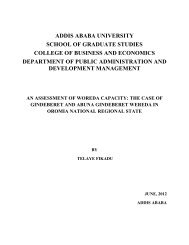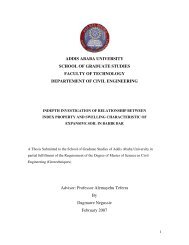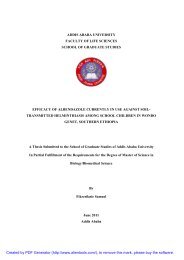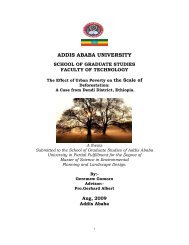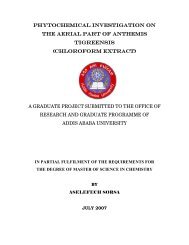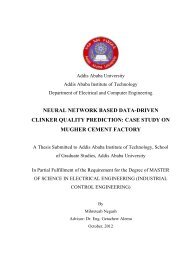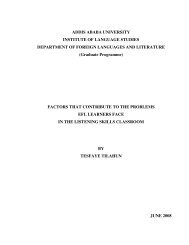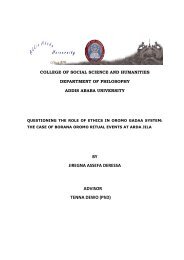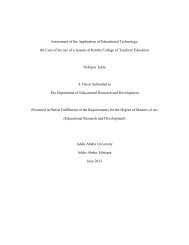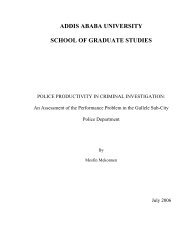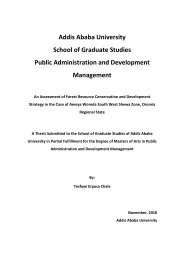HENOK MERHATSIDK 1.pdf - Addis Ababa University
HENOK MERHATSIDK 1.pdf - Addis Ababa University
HENOK MERHATSIDK 1.pdf - Addis Ababa University
Create successful ePaper yourself
Turn your PDF publications into a flip-book with our unique Google optimized e-Paper software.
Ethiopia is a black colonizer. Moreover, the Oromos argued that Menelik conquest of their<br />
area in 1880 th was brutal and it confiscated land from the indigenous people and made them<br />
tenants for Menelik soldiers (Merera, 2003: 4-8).<br />
The combined effect of the above events led to armed struggle by Oromo’s in different parts<br />
of their regions. The Bale peasant revolt was one of Oromo’s resistances against the Emperor<br />
regime Mach- Tuuluma Association was another threat for the Haile Sellasie regime and both<br />
efforts were controlled by the government. The Temporary form of Oromo resistance is the<br />
OLF; it was fighting the Derg regime along with EPLF and TPLF. In 1991 OLF was one of<br />
active participant in the adoption of the Transitional Charter of Ethiopia. The charter was<br />
generous enough for ethnic movements and the emphasis on Ethnic federalism that<br />
theoretically granted freedom of association, self rule, cultural autonomy, as well as<br />
secession but practically the charter proofed unimplemented. Therefore, opposition political<br />
fronts like OLF immediately withdrew from the Transitional government and started fighting<br />
in various Oromia regions. The engagement of OLF in armed struggle against the EPRDF<br />
was not sustained. The OLF fled to the neighboring countries of Kenya and Somalia (Kidane,<br />
2001:20-25; Wondwosen, 2009: 62)<br />
The Oromos have ethnic link with the Kenyans in Northern part of the country, this helped<br />
them to hide in Kenyan territory and launch their attack on Ethiopian military inside the<br />
Ethiopian soil. The infiltration of OLF into the Ethiopian border is some times hot some<br />
times cold issue (MOI, 2002:100). The Ethiopian and Kenyan officials discussed on the issue<br />
of OLF, they agreed to stop OLF operation in the border area but the result obtained from<br />
their agreement is not implemented. The security situation in the common border area some<br />
times deteriorated because of the OLF. (IGAD, 2009: 11-14) The Ethiopian and Kenyan<br />
officials are trying to fight the OLF by approaching the local communities in both sides;<br />
extensive discussion was taken place under CEWARUs (Conflict Early Warning and<br />
Response Units). 3<br />
3 Interview with Machani Nathan, First Secretary of Kenyan Mission in Ethiopia on Thursday15/11/2010.<br />
40




